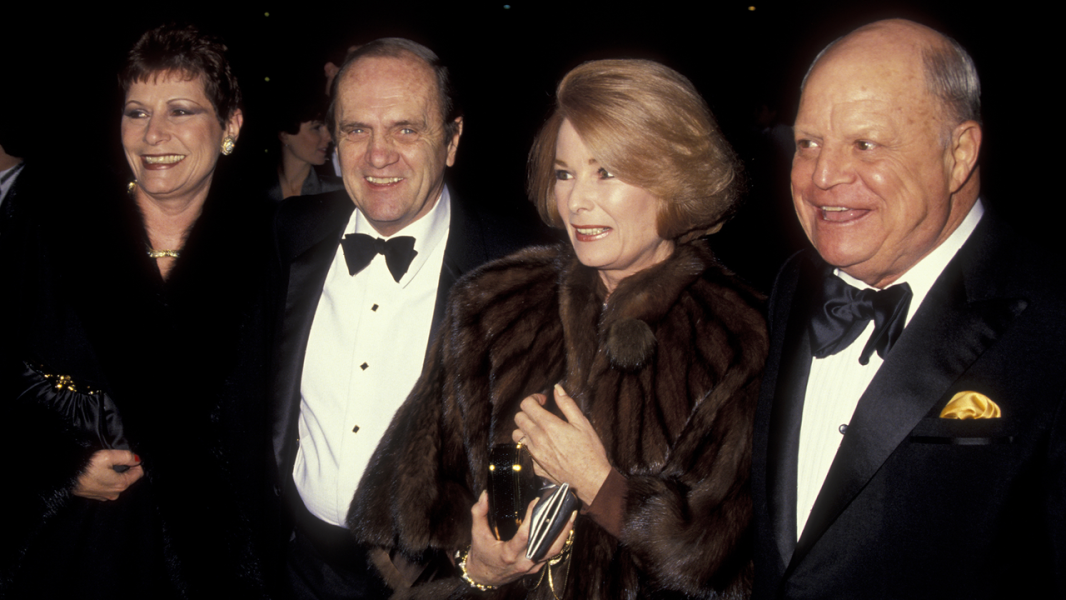
Save this storySave this storySave this storySave this story
The documentary—a mix of interviews, archival footage, and home videos—plays a bit like a eulogy, albeit a funny one.
Bob Newhart and Don Rickles occupied separate spheres in the comedy world of the nineteen-sixties and seventies, or so it seemed to viewers and listeners at home. Newhart achieved success overnight—not literally, of course, but about as close as anyone ever got in actual show business—with his début comedy album, “The Button-Down Mind of Bob Newhart.” Released in 1960, the record comprised a series of monologues with Newhart most often playing the ostensible straight man to an unheard interlocutor on the other end of a phone call. It hit No. 1 on the Billboard album chart—a first for a comedy LP—and would go on to win the Grammy for Album of the Year, beating out Harry Belafonte, Nat King Cole, and Frank Sinatra. A former ad man, Newhart had been doing standup for barely a year. He would become a fixture on television in the nineteen-seventies and eighties as the star of the CBS sitcoms “The Bob Newhart Show” and “Newhart.”
Rickles, meanwhile, had been slowly climbing the night-club comedy ladder for years when, in the late nineteen-fifties, Sinatra took a liking to him and gave his career a boost. Rickles’s forte was insult comedy. Stalking back and forth on stage, he’d address audience members as “dummy” or “hockey puck,” make fun of their clothes, their dates, their ethnicities. He won Sinatra over from a night-club stage by calling out, “Make yourself at home, Frank—hit somebody.” Rickles, who died in 2017 at the age of ninety, never found a TV vehicle that worked well for him, but even millennials and Gen Z-ers who have never seen a Dean Martin roast know him as the voice of Mr. Potato Head in the “Toy Story” movies.
So two comedians, one Rat Pack-adjacent, one more of the Bob and Ray school, and yet they were best friends for half a century—maybe not an odd couple, but certainly not an obvious couple. That bond is the subject of Judd Apatow’s documentary short “Bob and Don: A Love Story,” a mix of interviews, archival footage, and home videos which plays a bit like a eulogy, albeit a funny one. The director, having spent “every day” of his childhood watching “The Bob Newhart Show” in reruns, didn’t hesitate to say yes to the project, the brainchild of Rickles’s road manager, when he learned that Newhart, now ninety-four, was on board. In the director’s mind, there was a debt to be paid: “Bob is one of the main reasons I went into comedy,” Apatow told me. “He’s never asked me for anything before, and I’ve been waiting for him to ask my entire life.”
The older comedians met through their wives, Barbara Rickles and Ginnie Newhart, in the nineteen-sixties, one late night when both men were performing in Las Vegas. The two couples became a tight foursome, their chemistry so perfectly balanced that they would grumble if someone like Sinatra tried to horn in on a dinner. Despite the non-uxorious show-business milieu, both marriages endured and the couples frequently travelled together. “I love that they became friends because they both played Vegas and neither wanted to cheat on their wives,” Apatow said. Barbara Rickles died in 2021, four years after her husband, on what would have been their fifty-sixth wedding anniversary. Ginnie Newhart, who is interviewed in “Bob and Don,” died in April.
Born three years apart, Newhart and Rickles weren’t as mismatched as their stage personas and career paths might suggest. “In life, they have a very similar sense of humor. Bob is so funny when he’s making fun of Don,” Apatow said. “And now that Don’s gone, Bob is happy to insult Don just to you.” He added, “What’s so different about them is Bob was a real writer. He wrote those routines, which were, like, one-man sketches. . . . Don came from working really hard playing lounges and strip clubs, figuring out how to do crowd work, doing multiple shows a night into the wee hours in Vegas. Bob just got huge immediately. I think they used to give each other a hard time about that. Even now, Bob will make jokes about how he was playing larger rooms.”
Not all of Rickles’s jokes have aged well, especially the ethnic ones, as “Bob and Don” demonstrates on several occasions. “He came from a time when his theory was, It’s O.K. to make fun of people as long as you make fun of all of them,” Apatow explained. “There are certainly jokes he said which people would find really wrong at this moment in time. But it was definitely all done in fun, with a lot of love for the audience.” Think of it as a very old-school version of D.E.I. In her Profile of Rickles, published in 2004, Zoë Heller writes about the “progressive message underlying his faux misanthropy,” but adds that not everyone appreciated his humor or “cared to acknowledge the humanity beneath Rickles’s dyspepsia.”
Apatow said, “I don’t think there are two comedians that most comedians like more than Don Rickles and Bob Newhart. They’re just completely beloved characters. You might not notice it on the surface, but their influence is very deep in how people try to be funny.” I’d say there’s some Newhart DNA in Ayo Edebiri’s stammering and deadpan incredulousness on “The Bear” and in “Bottoms,” while you can sense Rickles’s spirit animating Martin Short’s snarky talk-show appearances or Michael Che and Sarah Sherman heaping abuse on Colin Jost during “Weekend Update” on “Saturday Night Live.”
Watch the film. It’s a treat. ♦
Sourse: newyorker.com






